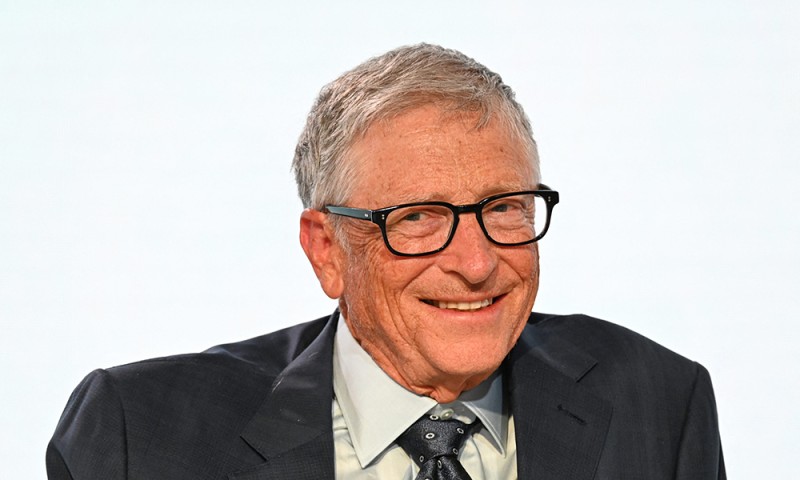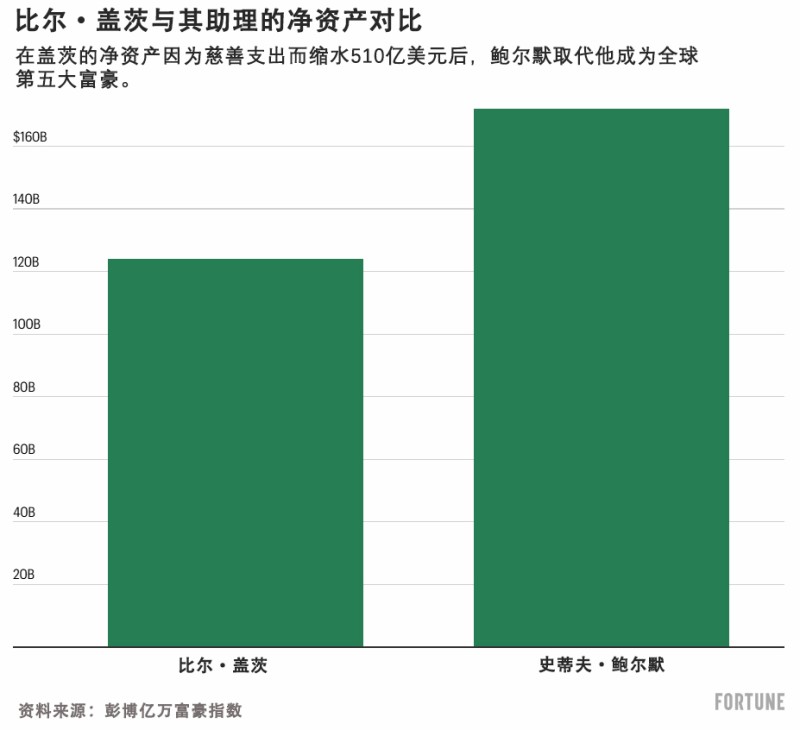
• 亿万富翁比尔·盖茨曾连续18年蝉联世界首富,但如今,他的前助理史蒂夫·鲍尔默已经比他更富有。在盖茨的净资产因为慈善支出而缩水510亿美元后,鲍尔默取代他成为全球第五大富豪,而盖茨则滑落至第12位。并且,这位微软(Microsoft)联合创始人在富豪榜上的排名将继续下滑,因为他决心不“带着财富离世”。
比尔·盖茨曾连续18年位居世界首富之列,目前因联合创立软件巨头微软而拥有令人艳羡的1,240亿美元净资产。但如今,由于盖茨数十亿美元的慈善捐赠,他的前助理在银行账户中的财富已经超过了他。
7月3日,盖茨身家高达1,750亿美元,在彭博亿万富豪指数(Bloomberg Billionaire Index)中排名全球第五。但在接下来的几天里,随着其净资产缩水510亿美元,他的财富急剧下降,排名也直线下跌至第12位,排在另一位科技先驱迈克尔·戴尔之后。
盖茨的财富之所以消失得如此迅速,是因为该指数根据这位69岁科技大亨的慈善行为进行了调整。彭博社指出,基于这位前微软CEO在5月8日博客文章中的说明,上周调低了其财富增值率,以“更好地反映盖茨的外部慈善捐赠和财富评估情况”。该说明披露,盖茨将比原计划更快地把巨额财富捐给慈善机构;未来20年内,他会将几乎全部财富捐给他与前妻梅琳达·弗兰奇·盖茨共同创立的盖茨基金会(The Gates Foundation),该基金会将于2045年底关闭。
盖茨写道:“当我离世时,人们会对我做出许多评价,但我决心不让‘他离世时很富有’成为其中之一。有许多难题亟待解决,我不能紧握那些本可用于助人的资源不放。”
多年来,盖茨一直坚持为了造福社会而削减个人财富,甚至表示他的子女将继承他“不到1%”的财富。如今,他的目标正反映在其净资产的变化上。他的慈善捐赠甚至为他微软时期的前助理史蒂夫·鲍尔默创造条件,使其以1,720亿美元身家取代盖茨成为全球第五大富豪,而这种情况并非首次发生。

《财富》已联系盖茨寻求置评。
史蒂夫·鲍尔默是谁?为何他比盖茨更富有?
大多数员工从未想过自己的收入会超过老板。但鲍尔默在一个幸运的时机踏入了微软的大门,此后数十年,财富便源源不断地流入他的银行账户。
1980年,鲍尔默加入尚处初创阶段的微软,担任总裁助理,是这家日益壮大的科技公司的第30名员工。他放弃了斯坦福大学(Stanford)的MBA课程来接受这份工作,并获得了5万美元的基本工资,外加他所创造业务利润增长部分的10%分成。鲍尔默当时并未获得任何股份,但事实证明,这笔10%的分成极其丰厚。
但不久后,公司业务飞速增长,这种利润分成方式在财务上不具可行性。于是经过重新谈判,鲍尔默用他的利润分成协议换取了公司8%的股权。公司的另一位联合创始人保罗·艾伦对这个交易并不满意,他认为给予鲍尔默的股份太多。但盖茨动用自己的资金满足了鲍尔默的要求,接下来的故事便众所周知了。
这位盖茨的前助理最终一路晋升,接替了老板的职位,在2000年至2014年间担任微软CEO。当他卸任CEO时,他持有3.33亿股微软股票,约合公司4%的股份,价值225亿美元。如今,69岁的鲍尔默的大部分投资组合仍与微软股票紧密相关,但他将自己庞大的财富归因于恰逢其时的选择,并且没有过早套现。
他去年对《华尔街日报》表示:“如果有人告诉你,他们的成功全因自己是天才,我会说他们应该感谢自己的好运气。别管股价如何。本质上,我很幸运得以聆听那些真正重要的人的见解。但我对公司的忠诚——作为公司领导者不愿出售股票——也为我带来了好运。”
此后,鲍尔默开始涉足科技以外的领域。这位婴儿潮一代人士在从微软退休的同一年,以20亿美元买下了洛杉矶快船队(Los Angeles Clippers),如今该球队的估值已达55亿美元。
在盖茨榜样的影响下,他也热衷于慈善事业;迄今为止,他已捐赠超过40亿美元财富,并创立了慈善组织鲍尔默集团(Ballmer Group),致力于改善美国家庭的经济流动性状况。(*)
译者:刘进龙
审校:汪皓
• 亿万富翁比尔·盖茨曾连续18年蝉联世界首富,但如今,他的前助理史蒂夫·鲍尔默已经比他更富有。在盖茨的净资产因为慈善支出而缩水510亿美元后,鲍尔默取代他成为全球第五大富豪,而盖茨则滑落至第12位。并且,这位微软(Microsoft)联合创始人在富豪榜上的排名将继续下滑,因为他决心不“带着财富离世”。
比尔·盖茨曾连续18年位居世界首富之列,目前因联合创立软件巨头微软而拥有令人艳羡的1,240亿美元净资产。但如今,由于盖茨数十亿美元的慈善捐赠,他的前助理在银行账户中的财富已经超过了他。
7月3日,盖茨身家高达1,750亿美元,在彭博亿万富豪指数(Bloomberg Billionaire Index)中排名全球第五。但在接下来的几天里,随着其净资产缩水510亿美元,他的财富急剧下降,排名也直线下跌至第12位,排在另一位科技先驱迈克尔·戴尔之后。
盖茨的财富之所以消失得如此迅速,是因为该指数根据这位69岁科技大亨的慈善行为进行了调整。彭博社指出,基于这位前微软CEO在5月8日博客文章中的说明,上周调低了其财富增值率,以“更好地反映盖茨的外部慈善捐赠和财富评估情况”。该说明披露,盖茨将比原计划更快地把巨额财富捐给慈善机构;未来20年内,他会将几乎全部财富捐给他与前妻梅琳达·弗兰奇·盖茨共同创立的盖茨基金会(The Gates Foundation),该基金会将于2045年底关闭。
盖茨写道:“当我离世时,人们会对我做出许多评价,但我决心不让‘他离世时很富有’成为其中之一。有许多难题亟待解决,我不能紧握那些本可用于助人的资源不放。”
多年来,盖茨一直坚持为了造福社会而削减个人财富,甚至表示他的子女将继承他“不到1%”的财富。如今,他的目标正反映在其净资产的变化上。他的慈善捐赠甚至为他微软时期的前助理史蒂夫·鲍尔默创造条件,使其以1,720亿美元身家取代盖茨成为全球第五大富豪,而这种情况并非首次发生。
《财富》已联系盖茨寻求置评。
史蒂夫·鲍尔默是谁?为何他比盖茨更富有?
大多数员工从未想过自己的收入会超过老板。但鲍尔默在一个幸运的时机踏入了微软的大门,此后数十年,财富便源源不断地流入他的银行账户。
1980年,鲍尔默加入尚处初创阶段的微软,担任总裁助理,是这家日益壮大的科技公司的第30名员工。他放弃了斯坦福大学(Stanford)的MBA课程来接受这份工作,并获得了5万美元的基本工资,外加他所创造业务利润增长部分的10%分成。鲍尔默当时并未获得任何股份,但事实证明,这笔10%的分成极其丰厚。
但不久后,公司业务飞速增长,这种利润分成方式在财务上不具可行性。于是经过重新谈判,鲍尔默用他的利润分成协议换取了公司8%的股权。公司的另一位联合创始人保罗·艾伦对这个交易并不满意,他认为给予鲍尔默的股份太多。但盖茨动用自己的资金满足了鲍尔默的要求,接下来的故事便众所周知了。
这位盖茨的前助理最终一路晋升,接替了老板的职位,在2000年至2014年间担任微软CEO。当他卸任CEO时,他持有3.33亿股微软股票,约合公司4%的股份,价值225亿美元。如今,69岁的鲍尔默的大部分投资组合仍与微软股票紧密相关,但他将自己庞大的财富归因于恰逢其时的选择,并且没有过早套现。
他去年对《华尔街日报》表示:“如果有人告诉你,他们的成功全因自己是天才,我会说他们应该感谢自己的好运气。别管股价如何。本质上,我很幸运得以聆听那些真正重要的人的见解。但我对公司的忠诚——作为公司领导者不愿出售股票——也为我带来了好运。”
此后,鲍尔默开始涉足科技以外的领域。这位婴儿潮一代人士在从微软退休的同一年,以20亿美元买下了洛杉矶快船队(Los Angeles Clippers),如今该球队的估值已达55亿美元。
在盖茨榜样的影响下,他也热衷于慈善事业;迄今为止,他已捐赠超过40亿美元财富,并创立了慈善组织鲍尔默集团(Ballmer Group),致力于改善美国家庭的经济流动性状况。(*)
译者:刘进龙
审校:汪皓
• Billionaire Bill Gates was once crowned the richest man in the world for 18 years, but now his former assistant, Steve Ballmer has topped his wealth. After Gates’ net worth plummeted $51 billion to reflect his philanthropic spending, Ballmer took his spot as the fifth richest man in the world, as Gates slipped down to 12th place. And the Microsoft cofounder will only continue to slide down the ranking as he’s determined to not die rich.
Bill Gates was once the richest man in the world for 18 years, and currently boasts a jealousy-inducing net worth of $124 billion from cofounding the software titan Microsoft. But now his former assistant has more money in his bank account than he does, thanks to Gates’ billion-dollar philanthropic spending.
On July 3 last week, Gates was standing on a fortune of $175 billion, ranked as the fifth wealthiest person alive on the Bloomberg Billionaire Index. But his wealth plummeted over the span of the next couple of days as $51 billion was drained from his net worth, shooting him down the list to 12th place right below fellow tech pioneer Michael Dell.
Gates’ wealth disappeared so rapidly as the index readjusted for the 69-year-old technology mogul’s philanthropic efforts. Bloomberg noted that the appreciation rates were lowered last week to “better reflect Gates’ outside charitable giving and the wealth estimate,” based on a May 8 blog post from the former Microsoft CEO. The note disclosed that Gates would be donating his vast fortune to charity much faster than previously planned; Over the next 20 years, he would donate almost all of his wealth to the The Gates Foundation that he spearheaded with ex-wife Melinda French Gates, which will close by the end of 2045.
“People will say a lot of things about me when I die, but I am determined that ‘he died rich’ will not be one of them,” Gates wrote. “There are too many urgent problems to solve for me to hold onto resources that could be used to help people.”
Gates has been determined to whittle down his wealth for the greater good for years, even saying that his children would inherit “less than 1%” of his fortune. And now, his goal is being reflected in his net worth. His charitable giving even cleared the way for his former assistant from the Microsoft days, Steve Ballmer, to take his spot in fifth with $172 billion to his name—and it’s not the first time it’s happened.
Fortune reached out to Gates for comment.
Who is Steve Ballmer—and why is he richer than Gates?
Most employees never expect to earn more than their bosses. But Ballmer got his foot in the door at a lucky time, and for decades since, money has been percolating into his bank account.
Microsoft was in its early days when Ballmer joined as an assistant to the president in 1980—the 30th employee to join the growing technology company. He had dropped out of Stanford’s MBA program to take the job, and was offered a $50,000 base salary alongside 10% of any profit growth he generated at the business. Ballmer didn’t get a single share at the time, but the 10% cut proved to be extremely lucrative.
But soon the business was growing so quickly that the portion wasn’t financially feasible, so in renegotiations, Ballmer traded his profit-sharing deal for an 8% stake in the company. The company’s cofounder Paul Allen wasn’t thrilled with the trade-off, arguing it was still too large of a share for Ballmer. But Gates put his own money on the line to fulfil Ballmer’s request—and the rest is history.
The former assistant to Gates eventually rose up the ranks and took his boss’ role, serving as CEO of the company from 2000 to 2014. He held 333 million shares in Microsoft, or around a 4% stake worth $22.5 billion, when he stepped down as chief executive. Today, most of the 69-year-old’s investment portfolio is still wrapped up in the business’ stock—but he attributes his vast wealth to being in the right place, at the right time and not cashing in too early.
“If there’s anybody that will tell you all their success is because they were a genius, I’d say they should go look for the luck,” told the Wall Street Journal last year. “Forget the stock price. I had luck, essentially, in getting to listen to the right people. But I also had luck in terms of my loyalty to the company and not wanting to be a seller as a leader of the business.”
Ballmer has since ventured into other arenas outside of tech. The baby boomer bought the Los Angeles Clippers for $2 billion the same year he retired from Microsoft, and the team is now valued at $5.5 billion.
Following in Gates’ footsteps, he also has a soft spot for charity; he’s donated more than $4 billion of his fortune so far, and founded philanthropic organization Ballmer Group focused on improving economic mobility for families in the United States.

